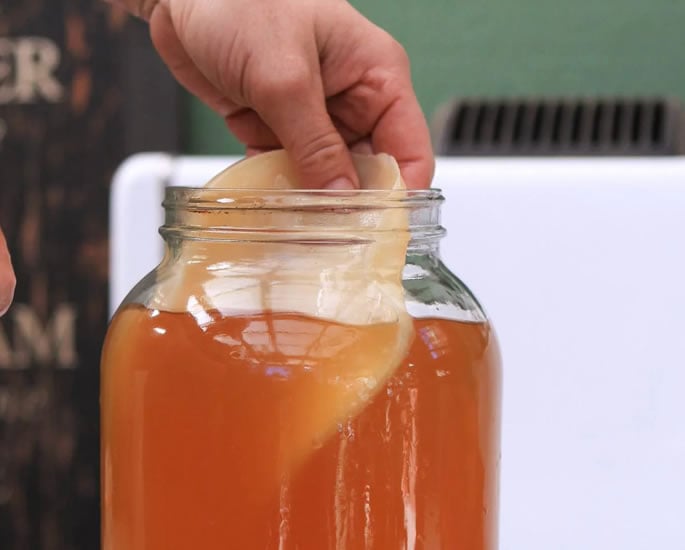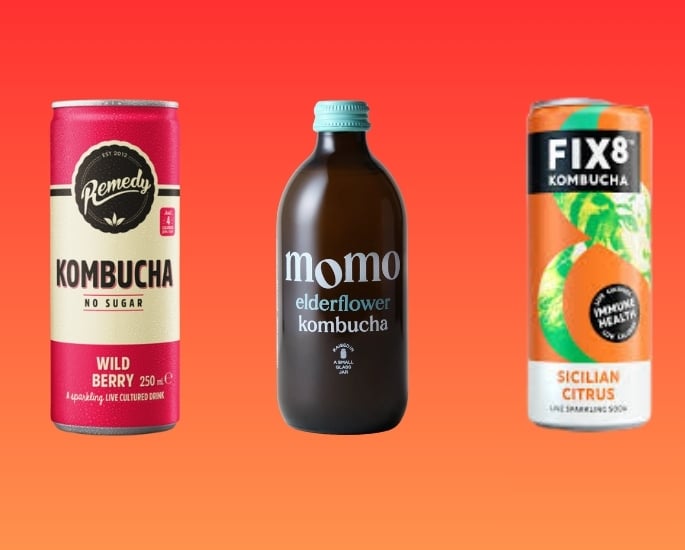"Indian kitchens have quietly celebrated the art of fermentation"
Kombucha, a beverage that is more than just fermented tea, is commonly seen on supermarket shelves and cafe menus across the UK.
This sharp-smelling, slightly fizzy, acidic drink is part of a global health trend, but its story is far from new.
It’s an ancient brew, with a history stretching back thousands of years, where it was once revered as the “elixir of life” in its native northeastern China.
This fascinating drink has journeyed through centuries and across continents to land at the centre of a modern debate: is it a microbial miracle packed with tangible health benefits, or simply a well-marketed marvel?
We delve into this drink and whether it is good for you.
What is Kombucha?

At its core, kombucha is a fermented drink made from four simple ingredients: tea (usually black or green), sugar, bacteria, and yeast.
The magic of transformation begins with the introduction of a SCOBY (Symbiotic Culture Of Bacteria and Yeast) into a batch of brewed, sweetened tea.
This living culture, a rubbery, disc-shaped entity, is a powerhouse of microorganisms.
Over a period of one to two weeks, a remarkable fermentation process unfolds.
The yeast in the SCOBY gets to work first, consuming the sugar in the tea and converting it into small amounts of alcohol and carbon dioxide, which gives the drink its natural fizz.
Following this, the bacteria take over, feeding on this alcohol and producing various organic acids, such as acetic acid and glucuronic acid.
It’s these acids that give kombucha its characteristic tangy, slightly vinegary flavour and contribute to its preservation.
This intricate combination between yeast and bacteria not only creates a unique taste profile but also produces a host of other compounds, including beneficial probiotics, vitamins, and antioxidants, turning simple sweet tea into the complex drink that has captivated so many.
What are the Benefits?

Much of the buzz around kombucha centres on its potential health benefits, many of which are rooted in the fermentation process.
While research is ongoing, and many studies are still in their early stages, the initial findings are promising.
A Boost for Gut Health
Kombucha’s primary claim to fame is its probiotic content.
Probiotics are live, beneficial bacteria that can help support a healthy gut microbiome, the complex community of trillions of microbes living in our digestive tract.
As Dr Federica Amati, head nutritionist at Zoe, explains, “the live ‘good’ bacteria is thought to support the health of your gut microbiome, which can have positive effects throughout all of your body’s systems”.
A balanced gut is crucial not only for efficient digestion and nutrient absorption but also for robust immune function and even mood regulation through the gut-brain axis.
However, it is important to note that the exact number of live probiotics can vary significantly from one bottle to the next, and some may die off during storage.
Rich in Powerful Antioxidants
Tea itself is a well-known source of antioxidants, and kombucha retains these properties.
It is particularly rich in compounds called polyphenols, which help protect the body’s cells from damage caused by oxidative stress and unstable molecules known as free radicals.
The specific antioxidant profile can vary depending on the type of tea used and the duration of fermentation, but all types provide a significant dose of these protective compounds.
Supporting Metabolic Health
Emerging evidence suggests that kombucha may play a role in metabolic health.
One review of several animal studies noted that kombucha helped reduce levels of “bad” LDL cholesterol while improving “good” HDL cholesterol.
Furthermore, research has linked the drink to improved glycemic control in people with Type 2 diabetes, potentially due to the presence of compounds like acetic acid, which are reported to have anti-diabetic properties.
While these findings are encouraging, more robust human trials are needed to confirm these effects.
A Twist on a Desi Tradition

While kombucha might seem fairly new in the UK, the principle behind it, fermentation, has been a cornerstone of South Asian cuisine for centuries.
As consultant hepatologist Dr Chetan Kalal told Hindustan Times:
“For generations, Indian kitchens have quietly celebrated the art of fermentation, from the tangy bite of kanji to the comforting creaminess of homemade dahi.”
This deep-seated cultural familiarity provides a unique and welcoming perspective for British South Asians.
From the fermented rice and lentil batters used to make idli and dosa to the savoury notes of dhokla, the tradition of using microorganisms to transform food is deeply woven into Desi culinary heritage.
Kombucha can therefore be seen not as a foreign health fad, but as a cousin to these beloved foods.
It offers another way to embrace the digestive benefits of living cultures, connecting a global wellness trend with the time-honoured wisdom of the Indian kitchen.
Navigating the Risks

Despite its many potential benefits, Dr Kalal warns that kombucha “isn’t a magic potion”, and it’s essential to be aware of the potential risks.
The very acidity that gives kombucha its signature tang can pose a risk to tooth enamel if it is consumed excessively and frequently.
Another key consideration is its alcohol content.
Although commercially produced kombucha is regulated to contain less than 0.5% alcohol by volume (ABV) to be sold as a non-alcoholic beverage, it is a natural byproduct of fermentation.
Home-brewed versions, if left to ferment for too long, can sometimes reach higher, more significant alcohol levels.
There is also a small but serious risk of contamination when home-brewing if the process is not carried out under strictly sterile conditions.
Using unsterilised equipment can lead to the growth of harmful bacteria and moulds, which have, in rare cases, been linked to adverse health events.
For these reasons, certain groups, including people with weakened immune systems, chronic liver disease, and pregnant women, are advised to exercise caution and consult a medical professional before adding it to their diet.
Making a Healthy Choice on the High Street

When selecting a kombucha from the shelf, it pays to be a discerning customer.
To ensure you are reaping the potential probiotic benefits, look for raw, unpasteurised varieties that are stored in the fridge, as the pasteurisation process kills the beneficial live microbes.
It is also wise to check the nutrition label for sugar content.
While sugar is essential for fermentation, some brands add extra sweeteners or fruit juices after the process is complete, which can significantly increase the final sugar count and negate some of the health benefits.
A good rule of thumb, according to Dr Amati, is to select a brand with few ingredients that clearly states it contains “live cultures”.
So, is kombucha the “elixir of life” it was once called?
The evidence suggests that while it may not be a miracle cure, it can be a valuable and enjoyable addition to a healthy, well-rounded lifestyle.
Rich in probiotics and antioxidants, it aligns perfectly with the growing understanding of the importance of gut health and mindful eating.
Yet, it is not a cure-all, and moderation, alongside an awareness of its potential risks, is key.
As Dr Kalal wisely concludes, when prepared safely and enjoyed in moderation, kombucha can “quietly complement” a balanced, fibre-rich diet, much like the fermented foods that have graced traditional Indian households for generations.
Whether you buy it from a store or decide to brew it in your own kitchen, kombucha offers a refreshing taste of an ancient tradition that is finding its rightful place in the modern, health-conscious world.
It serves as a delicious reminder that sometimes, the most profound transformations come from the simplest ingredients, a little patience, and the quiet magic of nature.






























































